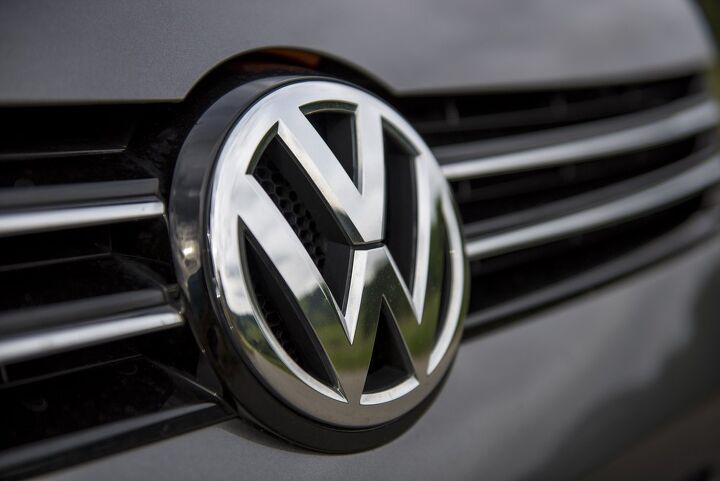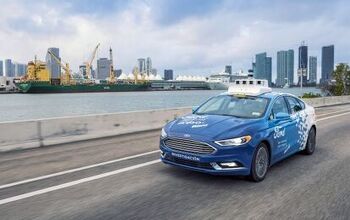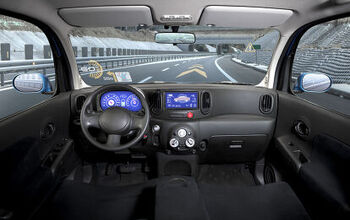Self-driving's Not the Only Development in the Ford-Volkswagen Relationship

Autonomous vehicle technology might not be a sexy topic for many some, but human-driven vehicles certainly are. One day we’ll gaze at steering wheels in a sterile museum with a mixture of animalistic hunger and soul-crushing depression.
Sure, Ford’s tie-up with Volkswagen includes self-driving technology (sourced from another tie-up, this one with Argo AI), but that’s only part of the agreement. Late last week, the two automakers moved forward on other projects that might be of interest to you.
On May 28th, VW’s Supervisory Board approved further projects under the alliance forged between the two companies early last year. The loose marriage of sorts is three-pronged, with one arm tasked with gathering and sharing self-driving tech for mobility projects. The other two include the creation of commercial vehicles for Europe and electric vehicles for Ford based on VW’s dedicated MEB architecture. Ford will bring the truck know-how, with VW providing the EV expertise.
“The next milestones in the vehicle projects are anticipated to be implemented in near the future with the signatures of both companies,” VW said in statement. “Three projects in the areas of electrification and commercial vehicles are planned to be realized as a first step.”
These projects are, for starters, the creation of a new MEB-based electric vehicle for Ford’s European customers. In that emissions-averse region, electrification is key to an automaker’s future standing. Ford needs something more accessible (read: cheaper) than the upcoming Mustang Mach-E. Enter new pal VW.
Also on the roster is a midsize pickup to be developed by Ford and “adapted by Volkswagen Commercial Vehicles in selected markets” The German automaker’s overseas-only Amarok is long in the tooth and VW would rather not fund the entirety of a replacement’s development costs. Enter the Ford Ranger as a seductive muse. Before the pandemic arrived, it was expected that a Ranger-based Amarok would see the light of day in 2022; it isn’t known whether the schedule has changed enough to alter the target date.
Lastly, the Supervisory Board green lit two van projects, with VE stating, “Volkswagen Commercial Vehicles will be responsible for the development of a city delivery van, while Ford will oversee planning for a van in the one-ton loader segment.”
Ford’s Transit trounces all others in the larger commercial van space, and VW would very much like to get itself a piece of that sweet fleet manager action.
VW admits that “additional projects may follow” to capitalize on the two company’s strengths and create value for the other.
[Image: Gyuszko-Photo/Shutterstock]

More by Steph Willems
Latest Car Reviews
Read moreLatest Product Reviews
Read moreRecent Comments
- Corey Lewis It's not competitive against others in the class, as my review discussed. https://www.thetruthaboutcars.com/cars/chevrolet/rental-review-the-2023-chevrolet-malibu-last-domestic-midsize-standing-44502760
- Turbo Is Black Magic My wife had one of these back in 06, did a ton of work to it… supercharger, full exhaust, full suspension.. it was a blast to drive even though it was still hilariously slow. Great for drive in nights, open the hatch fold the seats flat and just relax.Also this thing is a great example of how far we have come in crash safety even since just 2005… go look at these old crash tests now and I cringe at what a modern electric tank would do to this thing.
- MaintenanceCosts Whenever the topic of the xB comes up…Me: "The style is fun. The combination of the box shape and the aggressive detailing is very JDM."Wife: "Those are ghetto."Me: "They're smaller than a Corolla outside and have the space of a RAV4 inside."Wife: "Those are ghetto."Me: "They're kind of fun to drive with a stick."Wife: "Those are ghetto."It's one of a few cars (including its fellow box, the Ford Flex) on which we will just never see eye to eye.
- Oberkanone The alternative is a more expensive SUV. Yes, it will be missed.
- Ajla I did like this one.


































Comments
Join the conversation
In 50 years people are going to wonder how their ancestors ever drove with just a wheel and two/three pedals. Their lives will be all push-button and probably virtual push-buttons oriented.
So, as we've seen from previous posts about VW's upcoming BEV's - they're not "ready for prime time," with early adopters being the beta testers, and Ford is signing up to use their architecture for their own vehicles?? Isn't that like watching a puppy walk right into a spinning fan blade?